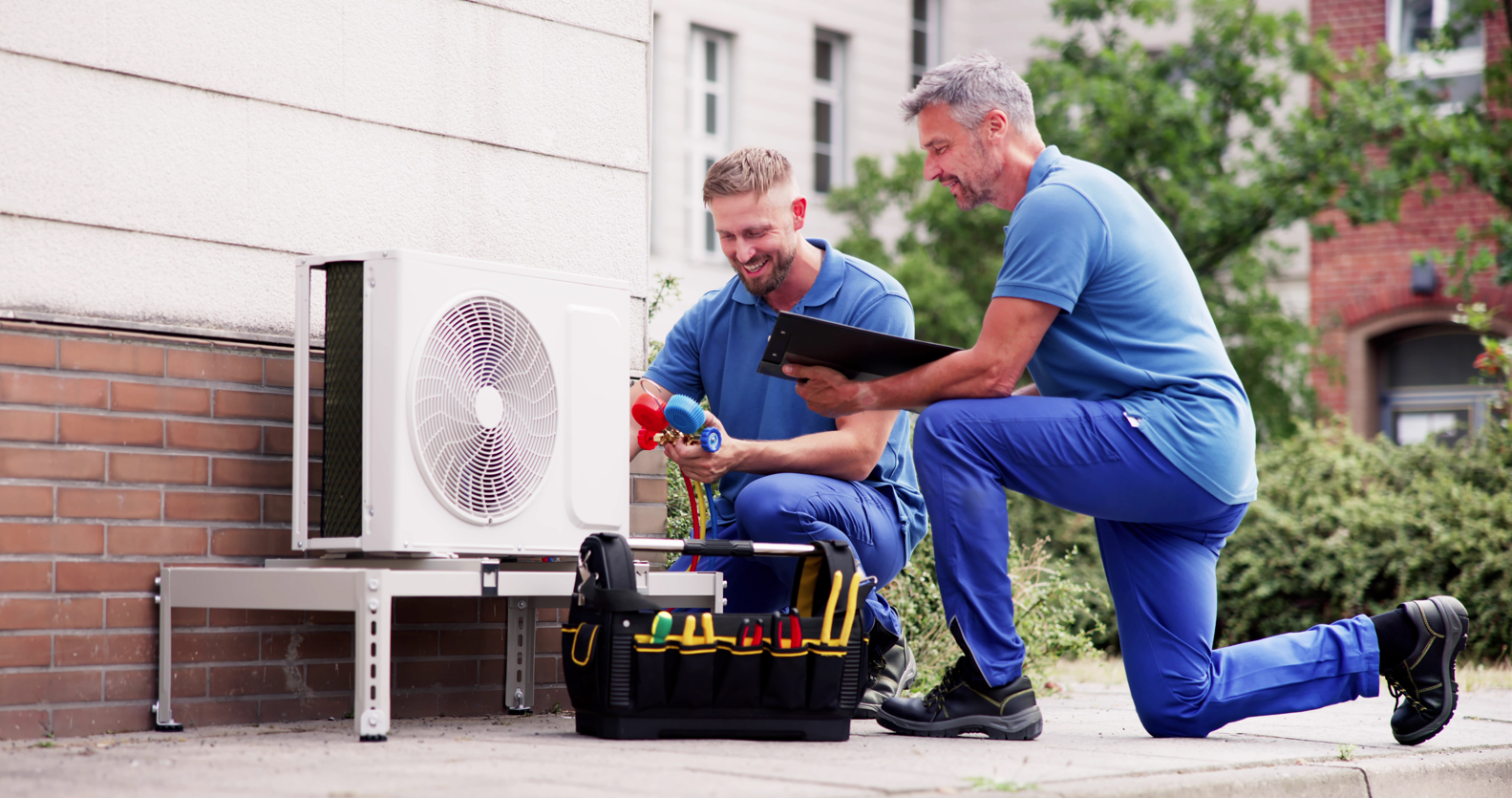- Article
- November 19, 2024
Expert advice on choosing a heat pump: more powerful is not necessarily better

Heat pumps have been known for decades as one of the most efficient and environmentally friendly heating and cooling systems. However, when choosing the right heat pump, residents are faced with several questions related to the size of the house, its energy efficiency class, climate conditions, financial possibilities and payback. Aurimas Esmantas, Brand Development Manager at ACC Distribution, talks about the main types of heat pumps, their features, maintenance and choosing the best option.
Similar operating principle – different applications
A heat pump takes heat from the environment (air, water or ground) and transfers it to the room. There are three main types of heat source: air-to-air, air-to-water and ground-to-water.
According to Mr. Esmantas, air-to-air pumps are the cheapest and best choice for garden houses or country houses. “These heat pumps heat or cool rooms quickly and efficiently, but they do not have heat storage, so the rooms cool down quickly when the pump is switched off. Of course, it’s just as easy and quickly starts heating the room. Often, residents choose this system when they don’t want to install underfloor heating or a radiator system,” says the heat pump expert, adding another advantage of air-to-air heat pumps: they don’t need to be topped up with water.
According to the specialist, air-to-water pumps have been popular for a long time because of their efficiency and their ability to be integrated into a radiator or underfloor heating system. “Air-to-water heat pumps are ideal for new buildings or renovations, but care must be taken to ensure that the renovation achieves at least energy efficiency class B. Otherwise, the heat pump will work inefficiently and may not provide sufficient heating, resulting in very high energy bills. Air-to-water pumps also have a cooling function and the ability to heat water by connecting a boiler,” says Mr. Esmantas.
Ground-water pumps, also known as geothermal pumps, are the most efficient, but require a higher initial investment. “Geothermal heating has the advantage that it uses heat from the ground, so its efficiency is not very dependent on the outside air temperature. Even in extreme cold, there is minimal temperature change in the deeper layers of the ground. This is the best solution for large houses, which can be up to 350 sq. meters,” says the expert.
More powerful and bigger – not necessarily better
When talking about what influences the choice of a heat pump, Mr. Esmantas mentions not only the size of the house, but also its insulation, heating needs and requirements for additional features.
“The heat pump’s capacity must be selected according to the energy efficiency class of the house. New-built houses with a high A++ rating need a lower output because they have minimal heat loss. Older homes may need a higher capacity heat pump, but it is also important to consider the efficiency of radiators or underfloor heating. For example, underfloor heating requires much lower water temperatures than radiators, so the capacity of the heat pump should be different in these cases. For a new building, A++ house of up to 100 sq. m. with underfloor heating, will be enough of 20 W/m2 power unit will be sufficient. However, I believe that the best way to choose a heat pump is to order a heat loss calculation service for the house and have a very clear choice.” the expert points out.
One of the most common mistakes A. Esmantas identifies is choosing unit that is too powerful than needed: “It is understandable that a too weak unit will not provide sufficient heating, but if you choose a pump that is too powerful, you won’t be happy with your electricity bills and the longevity of the unit will be reduced. I’ve noticed that often people are misled by technicians who advise them that a more powerful heat pump will definitely be better.”
When it comes to the price of heat pumps, he says that a higher price does not necessarily mean that the basic functions of the unit will be better. “All units will perform their basic function of heating the home, regardless of price. It’s true that the cheapest heat pumps may not have maintenance or additional features. “At ACC Distribution, we only represent manufacturers that offer technical support after sales – Gorenje, TCL, Hisense. It is also important to us when choosing manufacturers that the units are tested in research laboratories to ensure their quality,” says Mr. Esmantas.
According to the specialist, the smallest air-to-air unit can be assembled from €750 including labor and materials. An air-to-water pump will require an investment of at least €3,800 including labor and materials. The cost of ground-water units starts at between €5000 and €6000, but in addition a borehole will cost minimum of €2500.
Most common error – changing device settings
Like any other technical device, a heat pump requires regular maintenance. Annual maintenance helps to ensure efficient operation and longevity of the heat pump. It is very important to carry out maintenance every 1-2 years. If the unit is properly cleaned and potential faults are detected in time, it will last much longer.
According to the specialist, one of the most common mistakes made by people who have heat pumps is changing the parameters of the unit. The settings chosen by the installer during the initial installation are the most technically appropriate and should not be changed. Often, when people call a technician for a malfunctioning unit, they do not even remember what changes they made.
“I would also advise you not to lower the comfort temperature in your home if you are going away for a short period of time. For example, when you are away for a week, you set the air-to-water pump to keep the house at 16 degrees instead of 22 degrees. These pumps change their settings quite slowly, so it will take a while for the temperature to drop, and then the pump will use a lot of electricity to keep it higher. So in this situation, the consumer is not saving anything, but is just unbalancing the pump,” says Mr. Esmantas about the most common mistakes.
Aurimas Esmantas, Brand Development Manager at ACC Distribution
For air-to-water pumps, it is also very important to ensure the quality of the water to prevent corrosion inside the unit. Very often borehole water is iron-rich, so that in enameled boilers, minimal pressure fluctuations can lead to irreversible processes such as sedimentation of the heating element, bad smells, corrosion of the unit, and failure of the hot water and cooling mechanisms. It is therefore necessary to choose suitable water filters or to use pumps that are manufactured with stainless steel boilers, such as Hisense. It is also necessary to control the electrical charge inside the boiler, as this can also cause corrosion. It is therefore important to choose a good earthing system for the heating element and for the interior itself.
One of the more common causes of heat pump failure is fluctuating electrical voltages. “I have noticed that residents are reluctant to invest in proper electrical wiring to avoid voltage fluctuations. In many cases, heat pumps can burn out in the event of a sudden surge in voltage,” points out the ACC Distribution representative.
Easy installation and attention to design
The expert notes that manufacturers are increasingly focusing on the design of installations. “For the installation of an air-to-water heat pump, it is important to choose a room that is well ventilated and free of high humidity to avoid condensation and possible impact on the pump’s electrical components. However, this room can also be your common hallway. In such cases, you can choose pumps with a modern design, such as Hisense, which has won the prestigious Red Dot design award,” says Mr. Esmantas.
Air-to-air pumps require minimal installation space, but the expert recommends that they should not be installed close to the ceiling for better air circulation. He also recommends assessing the sound level of the unit and, for comfort, choosing manufacturers with lower sound levels and multiple operating speeds. In this case, the expert points to Gorenje air conditioners, which not only have a wide range of programmable functions, but are also sufficiently quiet and filter the air, thus destroying airborne bacteria and reducing dust in the home.
Geothermal heating pumps need to be chosen for rooms that are as dry as possible, as there are many individual components in the unit. It is important that moisture does not accumulate on them, which could damage wiring connections, electronics or damage your home’s floors through excess condensation.
Sustainable choices with subsidies
The heat pump expert notes that this solution is most often chosen for its efficiency and cost-effectiveness, but stresses that it is also a sustainable solution. “All heat pumps use renewable energy sources – air, water or ground. While the refrigerants used in heat pumps can have an environmental impact, newer models use less harmful refrigerants that have minimal impact on our environment. I would also like to point out that in Lithuania it is possible to obtain a state subsidy for the installation of heat pumps, especially in renovated houses. For air-to-water heat pumps with an integrated boiler, it is possible to get compensation ranging from ~2000 euros for a 4 kW system to ~5000 euros for an 18 kW system,” shares Mr. Esmantas.
The expert also notes that heat pumps can be used to heat not only private homes, but also apartment buildings. “TCL, the manufacturer of air-to-water heat pumps, has a number of technical solutions for apartment blocks, where a heat pump heats several apartments, but each apartment can choose their own settings. For example, one apartment can be kept at 20 degrees and another at 23 degrees. The pump can also be connected to different heating systems – radiators in one apartment and underfloor heating in another. So, there is a wide range of choices, but the most important thing is to choose the right heat pump power and type for your home’s needs and climatic conditions,” says ACC Distribution’s Brand Development Manager.

